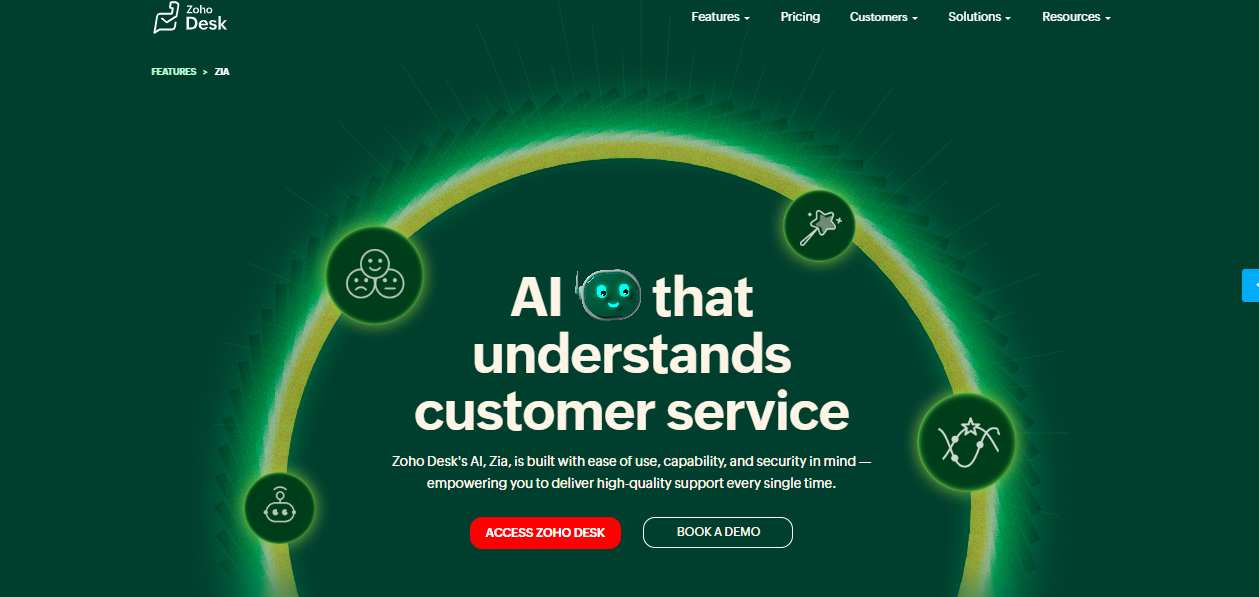
When evaluating AI customer support solutions, understanding exactly what each platform can and cannot do is crucial for making the right choice for your business. Zoho's Zia AI offers a unique approach as part of an integrated business suite, but it's not the right fit for every company. Here's an objective analysis to help you determine if Zia aligns with your specific business needs.
Zoho's Zia official product page
Zia is Zoho's AI assistant integrated across their entire business suite, including CRM, customer support (Zoho Desk), sales, marketing, and operations tools. Unlike standalone customer support AI solutions, Zia operates as part of a comprehensive business ecosystem, which creates both advantages and limitations depending on your current setup.
Core Technology: Natural language processing, machine learning, predictive analytics, and workflow automation built specifically for the Zoho ecosystem.
Zoho's Zia official product page
Problem: Your customer information is scattered across different platforms – CRM, support desk, email marketing, sales tools – making it impossible to get a complete customer view.
How Zia Addresses It: Since Zia operates across the entire Zoho suite, it maintains unified customer profiles that include support tickets, purchase history, communication preferences, and behavioral data in one place.
Best Fit For: Mid-size businesses (50-500 employees) currently using multiple disconnected tools and experiencing data silos.
Not Ideal For: Companies heavily invested in enterprise tools like Salesforce, HubSpot, or ServiceNow who need deep integrations with their existing tech stack.
Problem: Support quality varies dramatically between team members, leading to inconsistent customer experiences and resolution times.
How Zia Addresses It: Zia provides real-time suggestions to support agents, recommends solutions based on similar past tickets, and ensures consistent response quality through AI-guided workflows.
Best Fit For: Growing support teams where training and quality control are challenging to maintain.
Problem: You only know about customer issues when they complain, missing opportunities to prevent problems and improve satisfaction proactively.
How Zia Addresses It: Zia analyzes customer behavior patterns, usage data, and interaction history to predict potential issues and trigger proactive outreach.
Best Fit For: SaaS companies, subscription businesses, and service providers where customer success directly impacts retention.
Problem: Support tickets get assigned to wrong agents or sit in queues while urgent issues remain unaddressed.
How Zia Addresses It: Automatic ticket classification, intelligent routing based on agent skills and availability, and dynamic prioritization based on customer value and issue severity.
Best Fit For: Companies with 5+ support agents handling diverse issue types and customer segments.
Zoho's Zia official product page
Zoho's Zia official product page
Ideal Scenario: Your business is already using or planning to migrate to Zoho's business suite. Zia works best when it can access data from CRM, sales, marketing, and support tools within the same ecosystem.
Challenging Scenario: You're heavily invested in other enterprise platforms. While Zia offers APIs and integrations, you won't get the full benefit of its unified data approach.
Realistic Expectations:
Common Challenges:
Zoho's Zia official product page
Zoho costing page (Zia is not sold separately/comes with bundle)
Zia capabilities are included in higher-tier Zoho plans rather than sold separately. This creates value for businesses using multiple Zoho products but may be expensive for companies only needing customer support AI.
Total Cost Factors:
Measurable Benefits:
Less Tangible Benefits:
Zoho's Zia official product page
Zoho's Zia official product page
Zia's effectiveness depends on having sufficient historical data. New businesses or those with limited customer interaction history may not see immediate AI benefits.
While Zia offers good customization options, it's not as flexible as building custom AI solutions or using highly specialized platforms.
Zia meets standard security requirements (SOC 2, GDPR compliance) but may not satisfy highly regulated industries with specific compliance needs.
Zoho's Zia official product page
Choose Zia If:
Zoho's Zia official product page
Zoho Zia represents a solid choice for mid-market businesses seeking an integrated approach to customer support AI. Its strength lies in the unified data model and seamless integration across business functions.
For companies valuing operational consistency and unified customer experiences, Zia offers significant advantages.
This analysis is based on current platform capabilities as of 2025. Features and positioning may evolve as Zoho continues developing their AI capabilities.